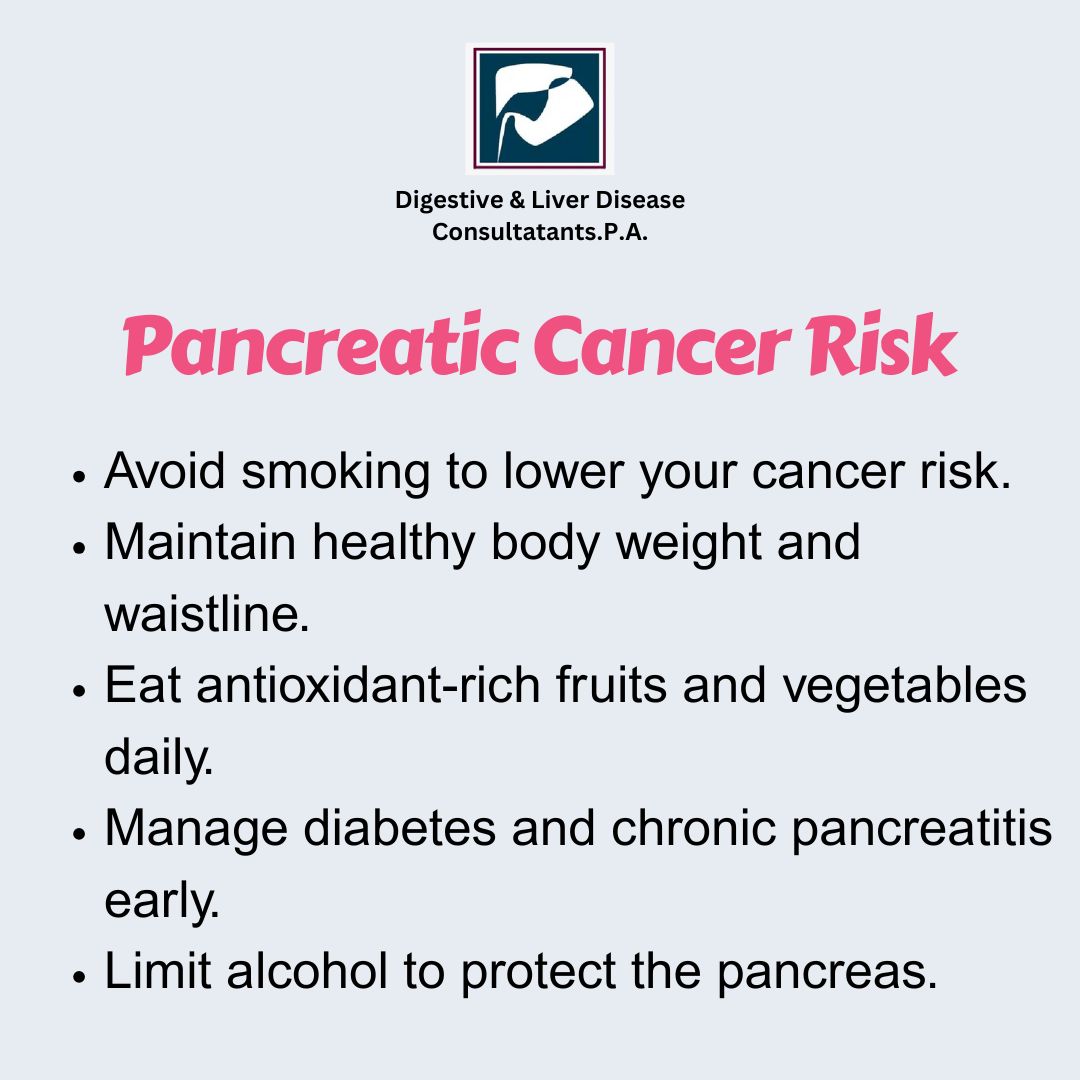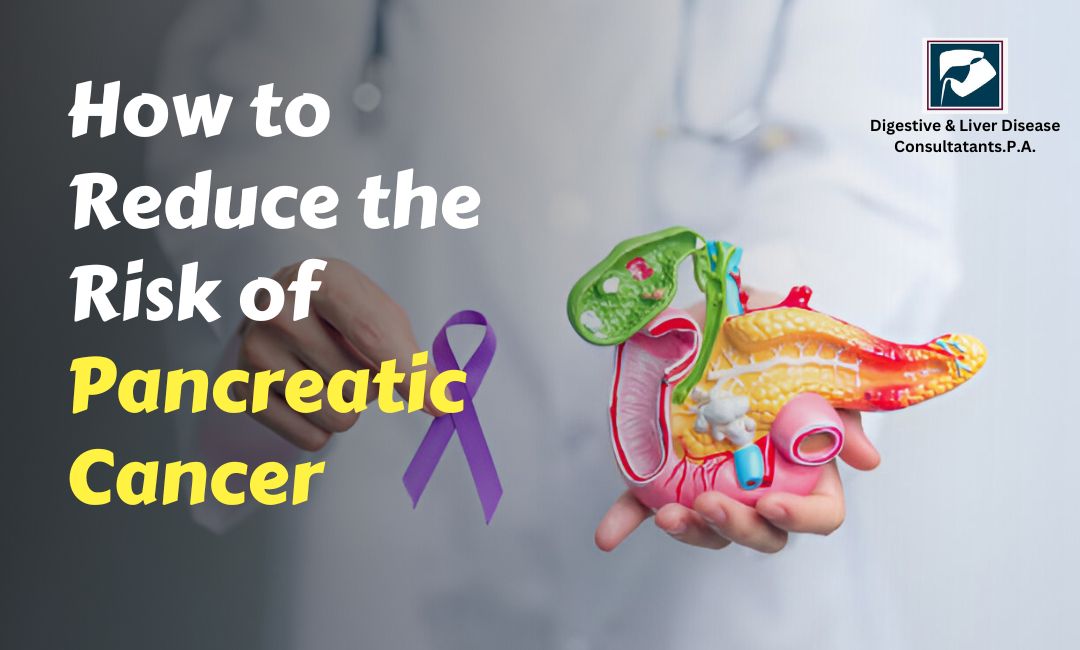Pancreatic cancer is one of the most serious forms of cancer because it is often diagnosed late and can be challenging to treat. However, while some risk factors like genetics cannot be changed, many lifestyle choices can help reduce your risk of developing pancreatic cancer. At Digestive & Liver Disease Consultants, P.A., we emphasize the importance of prevention through healthy habits and early detection. In this blog, we’ll explain what pancreatic cancer is, what increases your risk, and most importantly, practical steps you can take to protect yourself.
Understanding Pancreatic Cancer
The pancreas is a small organ located behind the stomach that helps with digestion and blood sugar regulation by producing important enzymes and hormones like insulin. Pancreatic cancer begins when abnormal cells grow uncontrollably in the pancreas. Because of its deep location, pancreatic cancer often does not cause symptoms until it has advanced, making early diagnosis difficult.
Risk Factors You Should Know
Some risk factors for pancreatic cancer cannot be changed, but knowing about them can help you stay vigilant:
Age: Most people diagnosed are over 60.
Family History: Having a close relative with pancreatic cancer increases risk.
Genetic Conditions: Certain inherited gene mutations can increase risk.
However, many risk factors are related to lifestyle choices, and these can be modified to reduce your chances of developing pancreatic cancer.

Steps to Reduce Your Risk of Pancreatic Cancer
1. Maintain a Healthy Weight
Obesity is linked to an increased risk of pancreatic cancer. Carrying excess body fat, especially around your abdomen, can lead to chronic inflammation and changes in hormone levels that may encourage cancer growth. To maintain a healthy weight:
- Eat a balanced diet rich in fruits, vegetables, whole grains, and lean proteins.
- Limit sugary drinks and processed foods.
- Exercise regularly—aim for at least 150 minutes of moderate activity weekly.
2. Stop Smoking
Smoking is one of the most significant risk factors for pancreatic cancer. The harmful chemicals in cigarettes damage DNA and contribute to the development of cancer cells. Quitting smoking can dramatically reduce your risk, and the benefits begin shortly after you stop.
If you need help quitting, many resources and support systems are available, including counseling, nicotine replacement therapies, and prescription medications.
3. Eat a Healthy Diet
A diet rich in plant-based foods may lower your risk of pancreatic cancer. Focus on:
Fruits and Vegetables: These contain antioxidants and vitamins that protect cells from damage.
Whole Grains: Fiber helps keep your digestive system healthy.
Limit Red and Processed Meats: Studies suggest high consumption of processed meats may increase cancer risk.
Avoiding excessive alcohol is also important since heavy drinking can increase the risk of chronic pancreatitis, a condition linked to pancreatic cancer.
4. Manage Diabetes and Chronic Pancreatitis
People with diabetes or chronic pancreatitis (inflammation of the pancreas) have a higher risk of pancreatic cancer. If you have diabetes, keep it well-controlled by:
- Following your healthcare provider’s advice.
- Monitoring blood sugar levels regularly.
- Maintaining a healthy diet and exercise routine.
If you suffer from pancreatitis, work closely with your doctor to manage the condition and reduce inflammation.
5. Regular Exercise
Physical activity helps you maintain a healthy weight and improve digestion and insulin sensitivity, which may lower pancreatic cancer risk. Try to include both aerobic exercises, like walking or swimming, and strength training in your weekly routine.
6. Avoid Exposure to Harmful Chemicals
Certain workplace chemicals, such as pesticides and industrial chemicals, have been linked to pancreatic cancer. If you work in an environment where you might be exposed to these substances, take precautions like using protective gear and following safety guidelines.
7. Know Your Family History and Get Regular Checkups
If you have a family history of pancreatic cancer or related genetic syndromes, discuss this with your doctor. Genetic counseling or screening might be recommended in some cases to detect early changes or risk.
At Digestive & Liver Disease Consultants, P.A., we emphasize the importance of regular health screenings and monitoring for individuals at higher risk.
When to See a Doctor
Pancreatic cancer symptoms can be subtle but may include:
- Abdominal or back pain
- Unexplained weight loss
- Jaundice (yellowing of the skin or eyes)
- Loss of appetite
- New-onset diabetes
If you experience any of these symptoms, especially if you have risk factors, it is important to seek medical advice promptly.
About Digestive & Liver Disease Consultants, P.A.
Digestive & Liver Disease Consultants, P.A. is a trusted center specializing in diagnosing and treating digestive system and liver diseases, including pancreatic disorders. Our team of experienced gastroenterologists uses the latest diagnostic tools to identify digestive health issues early. We provide personalized treatment plans to improve patient outcomes and quality of life.
Whether you need routine screening, management of chronic digestive conditions, or evaluation for potential cancers, our compassionate experts are here to guide you every step of the way.
Conclusion
While pancreatic cancer can be a serious diagnosis, there are many steps you can take to reduce your risk. Maintaining a healthy lifestyle, quitting smoking, eating a balanced diet, staying physically active, and managing existing health conditions are all key ways to protect your pancreas. Regular medical checkups and being aware of your family history can also make a difference in early detection.
If you experience any symptoms related to pancreatic or digestive health or have concerns about your risk factors, contact Digestive & Liver Disease Consultants, P.A. today.






